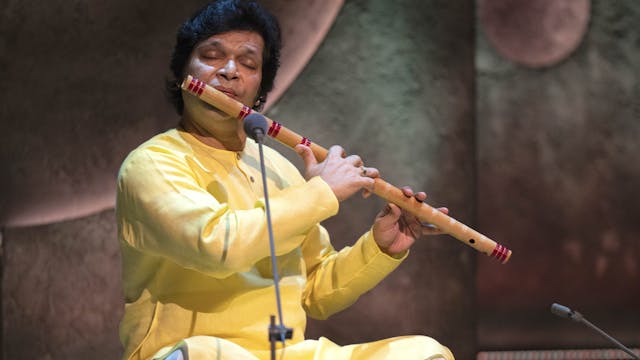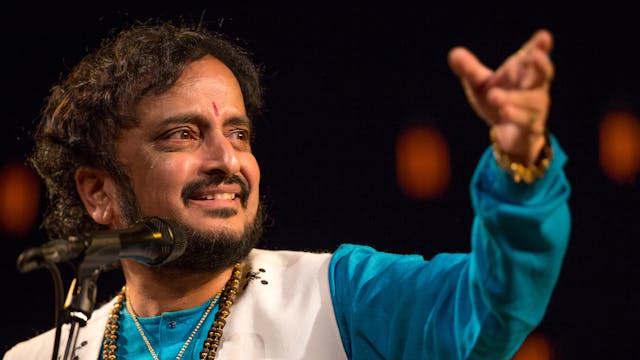Nishat Khan | Raag Bhairavi
Morning Ragas
•
8m 29s
Recorded at Darbar Festival 2017, on 12th November, at Sadler's Wells Theatre, London.
Musicians:
- Ustad Nishat Khan (sitar)
- Shahbaz Hussain (tabla)
- Emmanuel Masongsong (tanpura)
Raag Bhairavi; Thaat: Bhairavi; Samay: Morning
Ustad Nishat Khan presents two ragas – Darbari Kanada and Bhairavi in this concert. He represents an unbroken lineage of 7 generations of sitar and surbahar players. His father is the legendary Ustad Imrat Khan, a surbahar maestro and his uncle is none other than Ustad Vilayat Khan.
Ustad Khan begins Darbari Kanada with an alap. He traces the foundational elements of the raga - komal Ga and komal Dha - with meends, subtly suspending the notes in mid-air in a sustained sway of oscillations. He lustily portrays the withdrawn yet potent personality of the raga with consummate command over technique and emotions. The grace notes of komal Dha during descent and of komal Ga during both ascent and descent are captured with an enduring elegance. A vibrant jod and jhalla follow the alap, creating premonitions of the exciting rhythmic journey that is to follow.
In his sonorous voice, Ustad Khan demonstrates the composition, ‘Tumsa Karim Hakim Rahim’, (You are the compassionate one, the healer, the Almighty) before he begins the same on his sitar on a rhythmic cycle of 16 beats or Teental in madhyalay.
Shahbaz Khan plays a restrained accompaniment with Ustad Khan’s elaborations. He brings in flashes of deeply complex and energetic patterns during intervals accorded to him between the melodic development of the raga.
The faster composition, also in Teental, is decorated with intense laykari where the notes are bound in clusters of five, six and seven over the 16-beat cycle. Darbari Kanada is concluded with a dazzling jhalla in an upward tempo where Ustad Khan’s display of tantrakari (instrumental nuances) is well-complemented by Shahbaz Khan’s tabla.
Ustad Khan winds up his performance with a Dadra in Raag Bhairavi, “Saiyyan More Jaan Gaye Preetam,” of which, he also gives a vocal demonstration. The composition is set to a swaying lit of six beats – also known as Dadra, a folksy rhythm that is mostly used in sensuous, romantic songs derived from folk music of central and western India. Shahbaz Khan’s intonation of the romance and drama in this composition is heart-melting.
Up Next in Morning Ragas
-
Jyoti Hegde | Raag Basant
Recorded at Darbar Festival 2023, on 27th October, at Milton Court, Barbican, London.
Musicians:
- Jyoti Hegde (Rudra Veena)
- Surdarshan Chana (Jori)Raag Basant; Thaat: Bhairavi; Samay: Midnight
Dhrupad is the foremost improvisational classical system from India, rooted in its micro tonal sl...
-
Rakesh Chaurasia | Raag Ahir-Bhairav
Recorded at Darbar Festival 2022, at the Barbican Centre, London.
Musician:
- Rakesh Chaurasia (bansuri)Raag Ahir Bhairav, Thaat: Bhairav, Samay: Early Morning
Special performance filmed in an empty auditorium during Darbar Festival.
Chaurasia is a true exponent of the therapeutic impact of t... -
Kaivalya Kumar Gurav | Full Concert
Recorded at Darbar Festival 2017, on 12th November, at Sadler's Wells Theatre, London.
Musicians:
- Pandit Kaivalya Kumar Gurav (khayal)
- Gurdain Rayatt (tabla)
- Milind Kulkarni (harmonium)
- Seetal Dhadyalla & Kirutika Nadarajah (tanpuras)Music Pieces:
- Raag Gawati, Thaat: Khamaj, Samay: L...



